
Question Number 78357 by TawaTawa last updated on 16/Jan/20
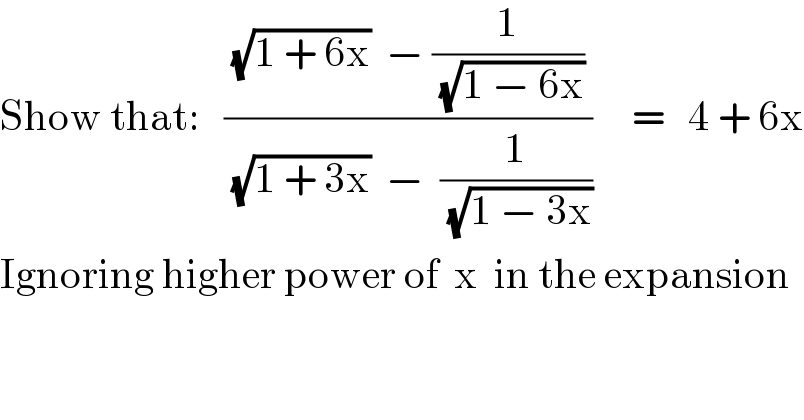
$$\mathrm{Show}\:\mathrm{that}:\:\:\:\frac{\sqrt{\mathrm{1}\:+\:\mathrm{6x}}\:\:−\:\frac{\mathrm{1}}{\sqrt{\mathrm{1}\:−\:\mathrm{6x}}}}{\sqrt{\mathrm{1}\:+\:\mathrm{3x}}\:\:−\:\:\frac{\mathrm{1}}{\sqrt{\mathrm{1}\:−\:\mathrm{3x}}}}\:\:\:\:\:=\:\:\:\mathrm{4}\:+\:\mathrm{6x} \\ $$$$\mathrm{Ignoring}\:\mathrm{higher}\:\mathrm{power}\:\mathrm{of}\:\:\mathrm{x}\:\:\mathrm{in}\:\mathrm{the}\:\mathrm{expansion} \\ $$
Commented by MJS last updated on 16/Jan/20
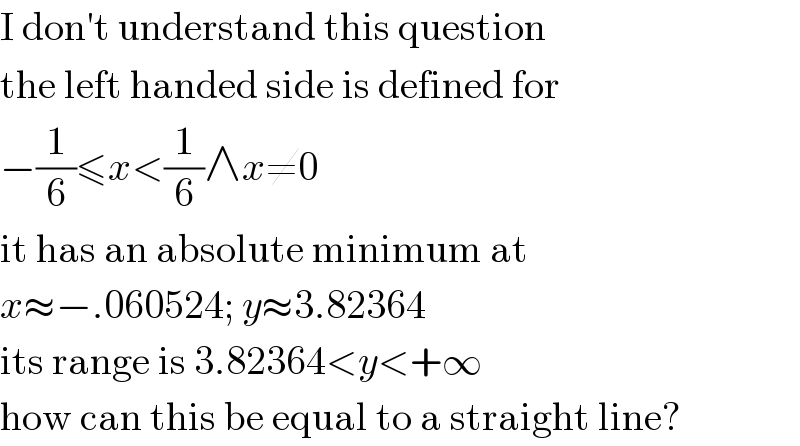
$$\mathrm{I}\:\mathrm{don}'\mathrm{t}\:\mathrm{understand}\:\mathrm{this}\:\mathrm{question} \\ $$$$\mathrm{the}\:\mathrm{left}\:\mathrm{handed}\:\mathrm{side}\:\mathrm{is}\:\mathrm{defined}\:\mathrm{for} \\ $$$$−\frac{\mathrm{1}}{\mathrm{6}}\leqslant{x}<\frac{\mathrm{1}}{\mathrm{6}}\wedge{x}\neq\mathrm{0} \\ $$$$\mathrm{it}\:\mathrm{has}\:\mathrm{an}\:\mathrm{absolute}\:\mathrm{minimum}\:\mathrm{at} \\ $$$${x}\approx−.\mathrm{060524};\:{y}\approx\mathrm{3}.\mathrm{82364} \\ $$$$\mathrm{its}\:\mathrm{range}\:\mathrm{is}\:\mathrm{3}.\mathrm{82364}<{y}<+\infty \\ $$$$\mathrm{how}\:\mathrm{can}\:\mathrm{this}\:\mathrm{be}\:\mathrm{equal}\:\mathrm{to}\:\mathrm{a}\:\mathrm{straight}\:\mathrm{line}? \\ $$
Commented by TawaTawa last updated on 16/Jan/20

$$\mathrm{And}\:\mathrm{sir},\:\mathrm{is}\:\mathrm{there}\:\mathrm{a}\:\mathrm{way}\:\mathrm{to}\:\mathrm{expand}\:\mathrm{the}\:\mathrm{roots}\:\mathrm{and}\:\mathrm{get}\:\mathrm{the}\:\mathrm{mormal} \\ $$$$\mathrm{expansion}\:\mathrm{sir}\:\mathrm{MrW}\:\mathrm{provided} \\ $$
Commented by TawaTawa last updated on 16/Jan/20

$$\mathrm{Sir}\:\mathrm{it}\:\mathrm{is}\:\mathrm{if}\:\:\mathrm{x}\:\mathrm{is}\:\mathrm{so}\:\mathrm{small}.\:\mathrm{prove}\:\mathrm{the}\:\mathrm{above}. \\ $$
Commented by MJS last updated on 16/Jan/20
![lim_(x→0) (lhs) =4 and lim_(x→0) ((d/dx)[lhs]) =6 ⇒ the tangent in x=0 is indeed 6x+4 but it′s not easy to expand the lhs](Q78372.png)
$$\underset{{x}\rightarrow\mathrm{0}} {\mathrm{lim}}\:\left(\mathrm{lhs}\right)\:=\mathrm{4}\:\mathrm{and}\:\underset{{x}\rightarrow\mathrm{0}} {\mathrm{lim}}\:\left(\frac{{d}}{{dx}}\left[\mathrm{lhs}\right]\right)\:=\mathrm{6}\:\Rightarrow \\ $$$$\mathrm{the}\:\mathrm{tangent}\:\mathrm{in}\:{x}=\mathrm{0}\:\mathrm{is}\:\mathrm{indeed}\:\mathrm{6}{x}+\mathrm{4} \\ $$$$\mathrm{but}\:\mathrm{it}'\mathrm{s}\:\mathrm{not}\:\mathrm{easy}\:\mathrm{to}\:\mathrm{expand}\:\mathrm{the}\:\mathrm{lhs} \\ $$
Commented by mathmax by abdo last updated on 16/Jan/20
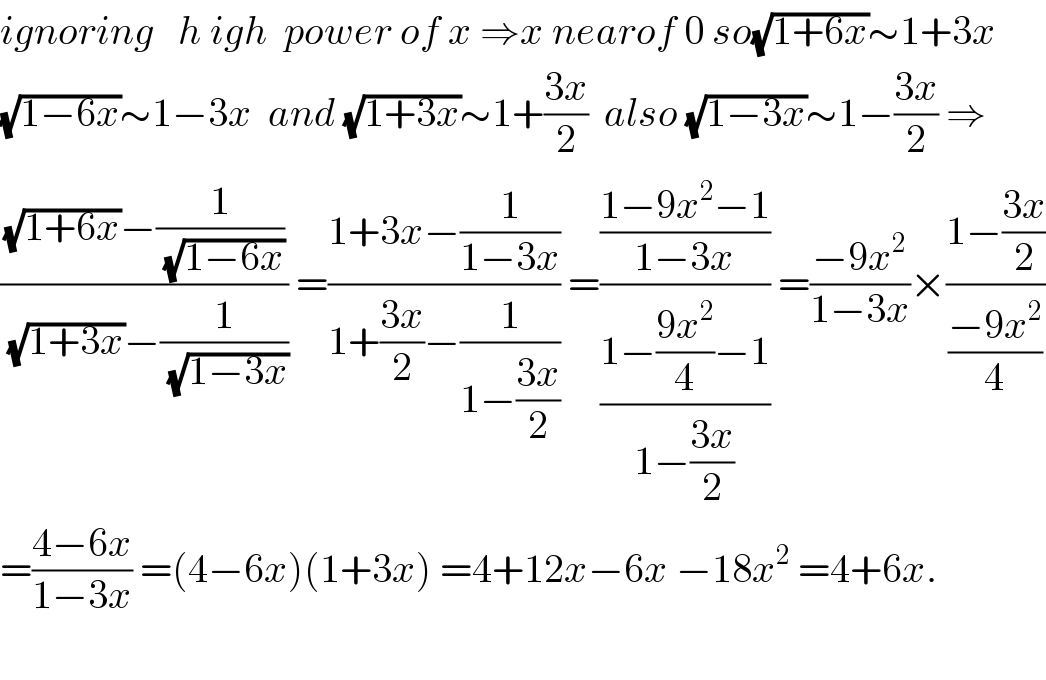
$${ignoring}\:\:\:{h}\:{igh}\:\:{power}\:{of}\:{x}\:\Rightarrow{x}\:{nearof}\:\mathrm{0}\:{so}\sqrt{\mathrm{1}+\mathrm{6}{x}}\sim\mathrm{1}+\mathrm{3}{x} \\ $$$$\sqrt{\mathrm{1}−\mathrm{6}{x}}\sim\mathrm{1}−\mathrm{3}{x}\:\:{and}\:\sqrt{\mathrm{1}+\mathrm{3}{x}}\sim\mathrm{1}+\frac{\mathrm{3}{x}}{\mathrm{2}}\:\:{also}\:\sqrt{\mathrm{1}−\mathrm{3}{x}}\sim\mathrm{1}−\frac{\mathrm{3}{x}}{\mathrm{2}}\:\Rightarrow \\ $$$$\frac{\sqrt{\mathrm{1}+\mathrm{6}{x}}−\frac{\mathrm{1}}{\sqrt{\mathrm{1}−\mathrm{6}{x}}}}{\sqrt{\mathrm{1}+\mathrm{3}{x}}−\frac{\mathrm{1}}{\sqrt{\mathrm{1}−\mathrm{3}{x}}}}\:=\frac{\mathrm{1}+\mathrm{3}{x}−\frac{\mathrm{1}}{\mathrm{1}−\mathrm{3}{x}}}{\mathrm{1}+\frac{\mathrm{3}{x}}{\mathrm{2}}−\frac{\mathrm{1}}{\mathrm{1}−\frac{\mathrm{3}{x}}{\mathrm{2}}}}\:=\frac{\frac{\mathrm{1}−\mathrm{9}{x}^{\mathrm{2}} −\mathrm{1}}{\mathrm{1}−\mathrm{3}{x}}}{\frac{\mathrm{1}−\frac{\mathrm{9}{x}^{\mathrm{2}} }{\mathrm{4}}−\mathrm{1}}{\mathrm{1}−\frac{\mathrm{3}{x}}{\mathrm{2}}}}\:=\frac{−\mathrm{9}{x}^{\mathrm{2}} }{\mathrm{1}−\mathrm{3}{x}}×\frac{\mathrm{1}−\frac{\mathrm{3}{x}}{\mathrm{2}}}{\frac{−\mathrm{9}{x}^{\mathrm{2}} }{\mathrm{4}}} \\ $$$$=\frac{\mathrm{4}−\mathrm{6}{x}}{\mathrm{1}−\mathrm{3}{x}}\:=\left(\mathrm{4}−\mathrm{6}{x}\right)\left(\mathrm{1}+\mathrm{3}{x}\right)\:=\mathrm{4}+\mathrm{12}{x}−\mathrm{6}{x}\:−\mathrm{18}{x}^{\mathrm{2}} \:=\mathrm{4}+\mathrm{6}{x}. \\ $$$$ \\ $$
Commented by TawaTawa last updated on 16/Jan/20

$$\mathrm{Wow},\:\mathrm{God}\:\mathrm{bless}\:\mathrm{you}\:\mathrm{sir}. \\ $$
Commented by mathmax by abdo last updated on 17/Jan/20

$${you}\:{are}\:{welcome} \\ $$
Answered by Kunal12588 last updated on 16/Jan/20
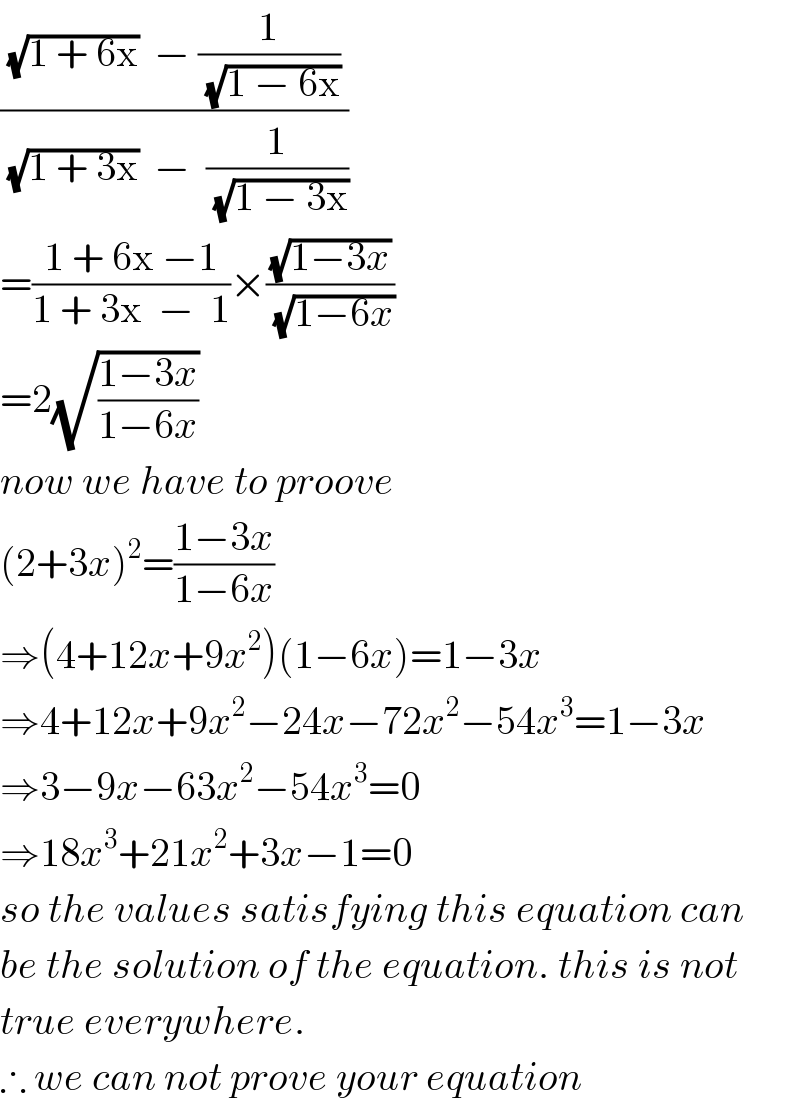
$$\frac{\sqrt{\mathrm{1}\:+\:\mathrm{6x}}\:\:−\:\frac{\mathrm{1}}{\sqrt{\mathrm{1}\:−\:\mathrm{6x}}}}{\sqrt{\mathrm{1}\:+\:\mathrm{3x}}\:\:−\:\:\frac{\mathrm{1}}{\sqrt{\mathrm{1}\:−\:\mathrm{3x}}}} \\ $$$$=\frac{\mathrm{1}\:+\:\mathrm{6x}\:−\mathrm{1}}{\mathrm{1}\:+\:\mathrm{3x}\:\:−\:\:\mathrm{1}}×\frac{\sqrt{\mathrm{1}−\mathrm{3}{x}}}{\sqrt{\mathrm{1}−\mathrm{6}{x}}} \\ $$$$=\mathrm{2}\sqrt{\frac{\mathrm{1}−\mathrm{3}{x}}{\mathrm{1}−\mathrm{6}{x}}} \\ $$$${now}\:{we}\:{have}\:{to}\:{proove} \\ $$$$\left(\mathrm{2}+\mathrm{3}{x}\right)^{\mathrm{2}} =\frac{\mathrm{1}−\mathrm{3}{x}}{\mathrm{1}−\mathrm{6}{x}} \\ $$$$\Rightarrow\left(\mathrm{4}+\mathrm{12}{x}+\mathrm{9}{x}^{\mathrm{2}} \right)\left(\mathrm{1}−\mathrm{6}{x}\right)=\mathrm{1}−\mathrm{3}{x} \\ $$$$\Rightarrow\mathrm{4}+\mathrm{12}{x}+\mathrm{9}{x}^{\mathrm{2}} −\mathrm{24}{x}−\mathrm{72}{x}^{\mathrm{2}} −\mathrm{54}{x}^{\mathrm{3}} =\mathrm{1}−\mathrm{3}{x} \\ $$$$\Rightarrow\mathrm{3}−\mathrm{9}{x}−\mathrm{63}{x}^{\mathrm{2}} −\mathrm{54}{x}^{\mathrm{3}} =\mathrm{0} \\ $$$$\Rightarrow\mathrm{18}{x}^{\mathrm{3}} +\mathrm{21}{x}^{\mathrm{2}} +\mathrm{3}{x}−\mathrm{1}=\mathrm{0} \\ $$$${so}\:{the}\:{values}\:{satisfying}\:{this}\:{equation}\:{can} \\ $$$${be}\:{the}\:{solution}\:{of}\:{the}\:{equation}.\:{this}\:{is}\:{not}\: \\ $$$${true}\:{everywhere}. \\ $$$$\therefore\:{we}\:{can}\:{not}\:{prove}\:{your}\:{equation} \\ $$
Commented by TawaTawa last updated on 16/Jan/20

$$\mathrm{It}\:\mathrm{means}\:\mathrm{the}\:\mathrm{expansion}\:\mathrm{is}\:\mathrm{not}\:\mathrm{correct}\:\mathrm{sir}\:? \\ $$
Commented by mr W last updated on 16/Jan/20

$${LHS}=\mathrm{4}+\mathrm{6}{x}+\frac{\mathrm{117}}{\mathrm{2}}{x}^{\mathrm{2}} +\frac{\mathrm{837}}{\mathrm{4}}{x}^{\mathrm{3}} +\frac{\mathrm{53703}}{\mathrm{32}}{x}^{\mathrm{4}} +... \\ $$$$=\mathrm{4}+\mathrm{6}{x}+{o}\left({x}^{\mathrm{2}} \right) \\ $$$$\neq\mathrm{4}+\mathrm{6}{x} \\ $$
Commented by TawaTawa last updated on 16/Jan/20

$$\mathrm{Sir},\:\:\mathrm{can}\:\mathrm{we}\:\mathrm{prove}\:\mathrm{it}\:\mathrm{to} \\ $$$$\mathrm{4}\:+\:\mathrm{6x}\:+\:\frac{\mathrm{117}}{\mathrm{2}}\mathrm{x}^{\mathrm{2}} \:+\:...\:\:\:\mathrm{sir}? \\ $$
Commented by mr W last updated on 16/Jan/20
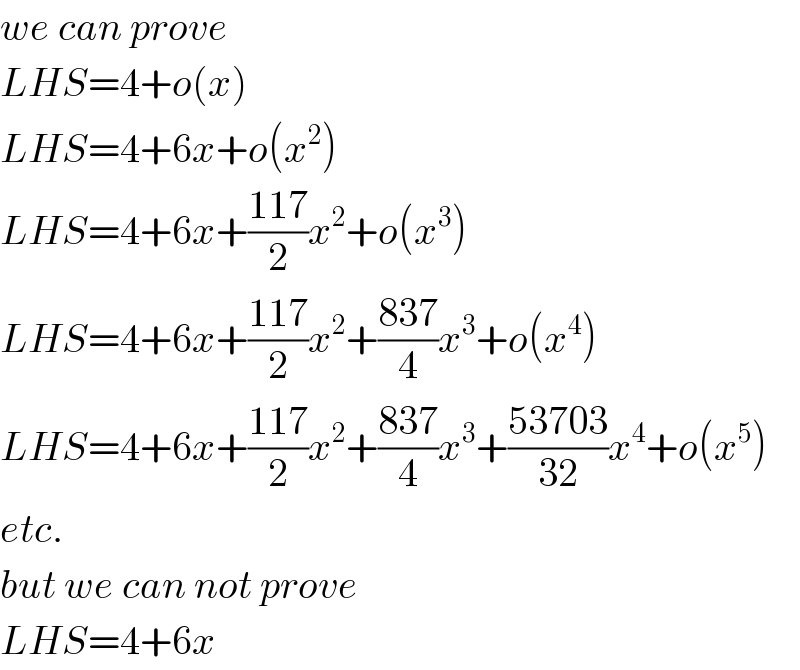
$${we}\:{can}\:{prove} \\ $$$${LHS}=\mathrm{4}+{o}\left({x}\right) \\ $$$${LHS}=\mathrm{4}+\mathrm{6}{x}+{o}\left({x}^{\mathrm{2}} \right) \\ $$$${LHS}=\mathrm{4}+\mathrm{6}{x}+\frac{\mathrm{117}}{\mathrm{2}}{x}^{\mathrm{2}} +{o}\left({x}^{\mathrm{3}} \right) \\ $$$${LHS}=\mathrm{4}+\mathrm{6}{x}+\frac{\mathrm{117}}{\mathrm{2}}{x}^{\mathrm{2}} +\frac{\mathrm{837}}{\mathrm{4}}{x}^{\mathrm{3}} +{o}\left({x}^{\mathrm{4}} \right) \\ $$$${LHS}=\mathrm{4}+\mathrm{6}{x}+\frac{\mathrm{117}}{\mathrm{2}}{x}^{\mathrm{2}} +\frac{\mathrm{837}}{\mathrm{4}}{x}^{\mathrm{3}} +\frac{\mathrm{53703}}{\mathrm{32}}{x}^{\mathrm{4}} +{o}\left({x}^{\mathrm{5}} \right) \\ $$$${etc}. \\ $$$${but}\:{we}\:{can}\:{not}\:{prove} \\ $$$${LHS}=\mathrm{4}+\mathrm{6}{x} \\ $$
Commented by TawaTawa last updated on 16/Jan/20

$$\mathrm{Sir}\:\mathrm{help}\:\mathrm{me}\:\mathrm{prove}\:\:\:\:\mathrm{4}\:+\:\mathrm{6x}\:+\:\mathrm{O}\left(\mathrm{x}^{\mathrm{2}} \right)\:\:\mathrm{when}\:\mathrm{chanced}\:\mathrm{sir}. \\ $$
Commented by TawaTawa last updated on 16/Jan/20

$$\mathrm{Thanks}\:\mathrm{for}\:\mathrm{your}\:\mathrm{time}. \\ $$
Commented by mr W last updated on 16/Jan/20

$${just}\:{calculate}\:{the}\:{taylor}\:{series}\: \\ $$$${f}\left({x}\right)={f}\left(\mathrm{0}\right)+\frac{{f}'\left(\mathrm{0}\right)}{\mathrm{1}!}{x}+\frac{{f}''\left(\mathrm{0}\right)}{\mathrm{2}!}{x}^{\mathrm{2}} +...... \\ $$
Commented by MJS last updated on 16/Jan/20

$$\mathrm{Sir}\:\mathrm{mrW},\:\mathrm{what}\:\mathrm{about}\:\mathrm{my}\:\mathrm{idea}\:\mathrm{using}\:\mathrm{the}\:\mathrm{limits}? \\ $$
Commented by mr W last updated on 16/Jan/20

$${good}\:{idea}\:{sir}!\:{we}\:{even}\:{have}\:{to}\:{use} \\ $$$${limits}\:{here},\:{since}\:{lhs}\:{is}\:{not}\:{defined} \\ $$$${at}\:{x}=\mathrm{0}. \\ $$
Commented by TawaTawa last updated on 16/Jan/20

$$\mathrm{Sir},\:\mathrm{help}\:\mathrm{me}\:\mathrm{use}\:\mathrm{the}\:\mathrm{limit}. \\ $$
Commented by mr W last updated on 16/Jan/20

$${a}\:{piece}\:{of}\:{pure}\:{routine}\:{work}!\:{try}\:{DIY}! \\ $$
Answered by mr W last updated on 16/Jan/20
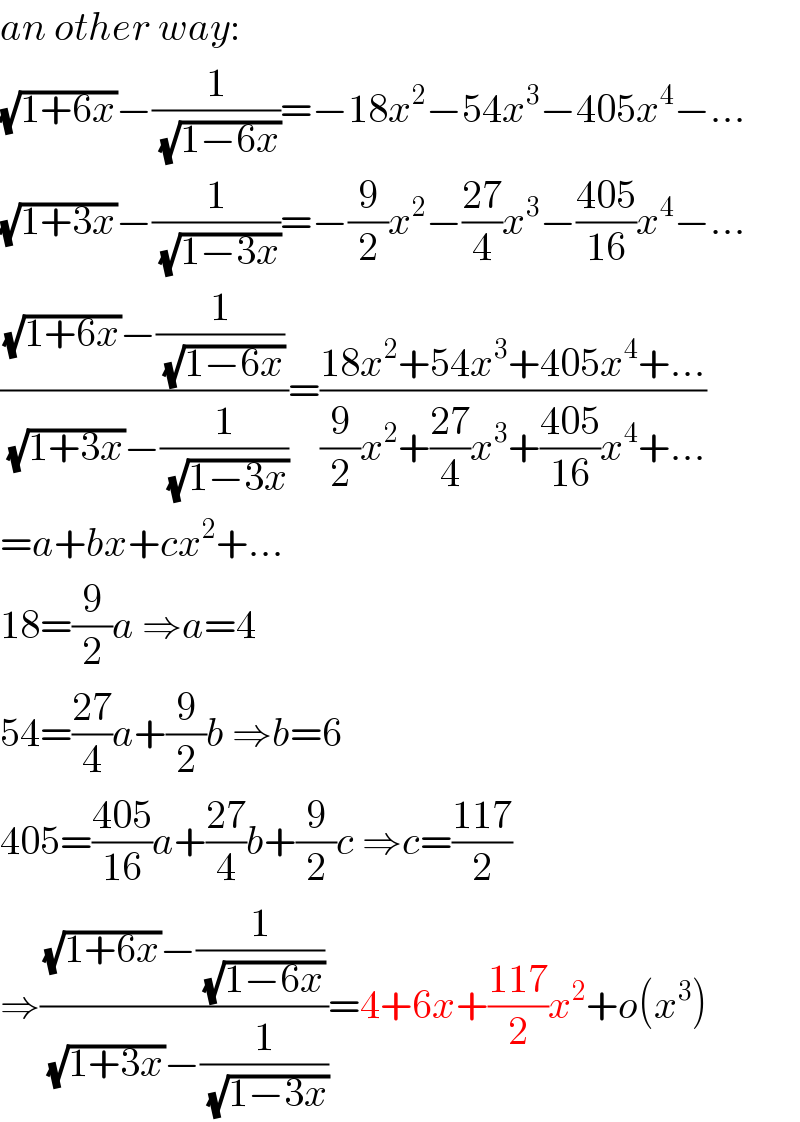
$${an}\:{other}\:{way}: \\ $$$$\sqrt{\mathrm{1}+\mathrm{6}{x}}−\frac{\mathrm{1}}{\sqrt{\mathrm{1}−\mathrm{6}{x}}}=−\mathrm{18}{x}^{\mathrm{2}} −\mathrm{54}{x}^{\mathrm{3}} −\mathrm{405}{x}^{\mathrm{4}} −... \\ $$$$\sqrt{\mathrm{1}+\mathrm{3}{x}}−\frac{\mathrm{1}}{\sqrt{\mathrm{1}−\mathrm{3}{x}}}=−\frac{\mathrm{9}}{\mathrm{2}}{x}^{\mathrm{2}} −\frac{\mathrm{27}}{\mathrm{4}}{x}^{\mathrm{3}} −\frac{\mathrm{405}}{\mathrm{16}}{x}^{\mathrm{4}} −... \\ $$$$\frac{\sqrt{\mathrm{1}+\mathrm{6}{x}}−\frac{\mathrm{1}}{\sqrt{\mathrm{1}−\mathrm{6}{x}}}}{\sqrt{\mathrm{1}+\mathrm{3}{x}}−\frac{\mathrm{1}}{\sqrt{\mathrm{1}−\mathrm{3}{x}}}}=\frac{\mathrm{18}{x}^{\mathrm{2}} +\mathrm{54}{x}^{\mathrm{3}} +\mathrm{405}{x}^{\mathrm{4}} +...}{\frac{\mathrm{9}}{\mathrm{2}}{x}^{\mathrm{2}} +\frac{\mathrm{27}}{\mathrm{4}}{x}^{\mathrm{3}} +\frac{\mathrm{405}}{\mathrm{16}}{x}^{\mathrm{4}} +...} \\ $$$$={a}+{bx}+{cx}^{\mathrm{2}} +... \\ $$$$\mathrm{18}=\frac{\mathrm{9}}{\mathrm{2}}{a}\:\Rightarrow{a}=\mathrm{4} \\ $$$$\mathrm{54}=\frac{\mathrm{27}}{\mathrm{4}}{a}+\frac{\mathrm{9}}{\mathrm{2}}{b}\:\Rightarrow{b}=\mathrm{6} \\ $$$$\mathrm{405}=\frac{\mathrm{405}}{\mathrm{16}}{a}+\frac{\mathrm{27}}{\mathrm{4}}{b}+\frac{\mathrm{9}}{\mathrm{2}}{c}\:\Rightarrow{c}=\frac{\mathrm{117}}{\mathrm{2}} \\ $$$$\Rightarrow\frac{\sqrt{\mathrm{1}+\mathrm{6}{x}}−\frac{\mathrm{1}}{\sqrt{\mathrm{1}−\mathrm{6}{x}}}}{\sqrt{\mathrm{1}+\mathrm{3}{x}}−\frac{\mathrm{1}}{\sqrt{\mathrm{1}−\mathrm{3}{x}}}}=\mathrm{4}+\mathrm{6}{x}+\frac{\mathrm{117}}{\mathrm{2}}{x}^{\mathrm{2}} +{o}\left({x}^{\mathrm{3}} \right) \\ $$
Commented by TawaTawa last updated on 16/Jan/20

$$\mathrm{Wow},\:\mathrm{God}\:\mathrm{bless}\:\mathrm{you}\:\mathrm{sir} \\ $$
Commented by mr W last updated on 16/Jan/20

$${sir},\:{if}\:{you}\:{are}\:{not}\:{only}\:{interested}\:{in} \\ $$$${result},\:{but}\:{want}\:{to}\:{learn}\:{the}\:{general} \\ $$$${method},\:{try}\:{to}\:{use}\:{taylor}\:{series}\:{and} \\ $$$${calculate}\:{f}\left(\mathrm{0}\right),{f}'\left(\mathrm{0}\right),\:{f}''\left(\mathrm{0}\right)\:{etc}. \\ $$
Commented by TawaTawa last updated on 16/Jan/20

$$\mathrm{Alright}\:\mathrm{sir}.\:\mathrm{God}\:\mathrm{bless}\:\mathrm{you}.\: \\ $$$$\mathrm{But}\:\mathrm{sir},\:\:\mathrm{i}\:\mathrm{am}\:\mathrm{a}\:\mathrm{miss}. \\ $$
Commented by peter frank last updated on 17/Jan/20

$${nice}\:{solution}.{both} \\ $$
